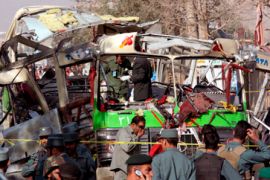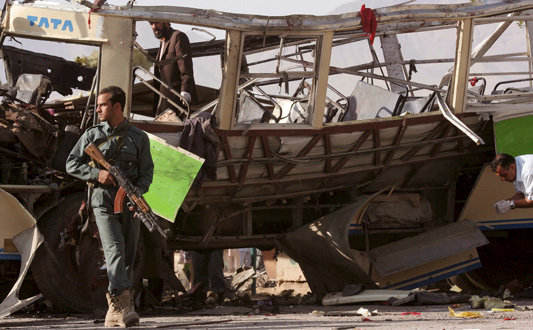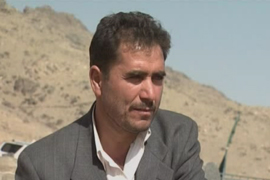Ramadan bombs rock Afghanistan
Hamish MacDonald on the Taliban’s ‘victory’ campaign.

 |
| Afghanistan has been rocked by a series of Ramadan bombings [EPA] |
On the eastern fringes of Kabul, Abdul Mobin, a doctor, is home early from work, but he cuts a lonely figure as he walks down the hill from his house.
Last week his wife and two children died, killed in a suicide attack on a bus taking police officers to work.
“Every day they left home 15 minutes before me, every day they said goodbye, my son Munir, on that day, I’m not lying, he said goodbye three or four times. He even came back to the house and said father goodbye.”
The Taliban claimed responsibility and said it was part of an offensive to mark the holy month of Ramadan.
| Afghan attacks | ||
|
A surge in the number suicide bombings has wracked Afghanistan during Ramadan making it one of the mostly deadly periods in the country since the invasion of foreign troops in 2001.
Forty-nine civilians were killed during Ramadan as a result of the Taliban’s ‘Nasrat’ (victory) offensive, according to the Afghan public health ministry.
The campaign involved a spate of at least 14 suicide bombings and a series of roadside explosions, most of which were aimed at foreign military as well as Afghan police and army officers.
Civilians, however, were among the casualties in almost every attack.
Ramadan has seen a distinct shift the type of violence in the Afghan conflict, and there are increasing similarities with the conflict in Iraq.
‘Soft targets’
 |
| Abdul Mobin’s family were killed in a suicide attack by the Taliban |
The trend towards suicide bombings indicates two changes in the mindset of the resurgent Taliban movement.
Firstly, that the Taliban is finding it increasingly difficult to attack foreign forces through traditional set-piece battles and is resorting to what military experts describe as “soft targets”, including buses and military convoys.
Secondly, the Taliban is even more willing to launch attacks which ultimately claim fellow Afghans among the victims.
Both are tactics that are evident in Iraq.
‘Brainwashed’
According to the United Nations Assistance Mission in Afghanistan (UNAMA), the first recorded suicide attack in this country took place in 2001 and the figures remained low until last year when the number of such blasts jumped to 123.
An indication of how much the situation has worsened is that last years total was surpassed in the first ten months of this year.
Sayed Mohammad Amin Fatimie, Afghanistan’s public health minister, says the suicide bombers “are brainwashed by the leaders or the politicians behind this hidden agenda.”
Fatamie, who regularly attends the scenes of suicide bombing to help coordinate the emergency response, estimates that 90 per cent of those carrying out the attacks are not Afghans.
This is consistent with the widely held belief in Afghanistan that suicide bombings are not part of Afghan culture.
However, UNAMA, which has interviewed more than 20 ‘failed’ suicide bombers as part of a recent report found almost all of the ‘failed’ attackers were Afghans.
Adrian Edwards, UNAMA’s spokesman says: “The intended target may be said to be a military convoy, or a police bus, but these things happen in areas where there are civilians.”
Eid attack
 |
| The Jalalabad highway is one of the most dangerous roads in the country |
A signal of this apparent disregard for civilian casualties was the decision by the Taliban to bomb a bazaar next to a mosque in Helmand province on Friday October 12 – the first day of Eid il-Fitr.
The Eid festival marks the end of Ramadan and the mosque in Gareshk was packed with hundreds of Muslims marking the occasion when the explosion took place.
It killed at least 2 Afghan police officers and wounded a dozen civilians.
An Taliban spokesman later defended the action saying that attacks were acceptable on any day of the year, including during Eid, “as long as it killed the enemy and helped drive the occupying forces out of the country.”
Threat to Nato
The strategy is a high-risk one for the Taliban, as public sympathy could diminish as civilians are targeted.
But it also poses a significant risk to the Nato and US-led coalition forces fighting in Afghanistan.
They will tell you that the conflict in this country remains distinctly different to the current violence in Iraq.
They claim the two theatres of conflict are fundamentally different in nature, but they ignore the similarities at their peril.
Because as has been the case in Iraq, the public may also soon conclude that the presence of foreign forces is also playing a role in perpetuating the violence.
The increasing use of suicide bombers and mounting civilian casualties by the Taliban should give pause for thought for those who continue to highlight the differences between the Afghan and Iraqi conflicts.
